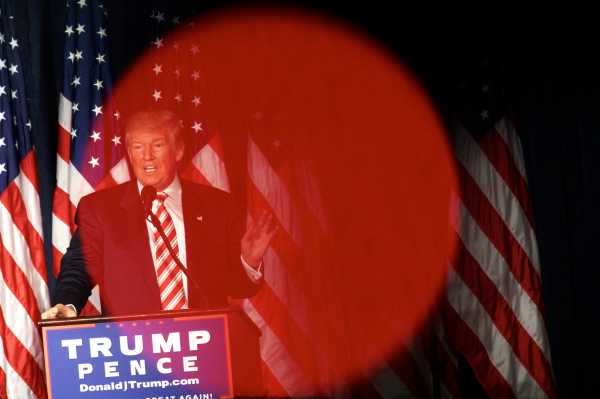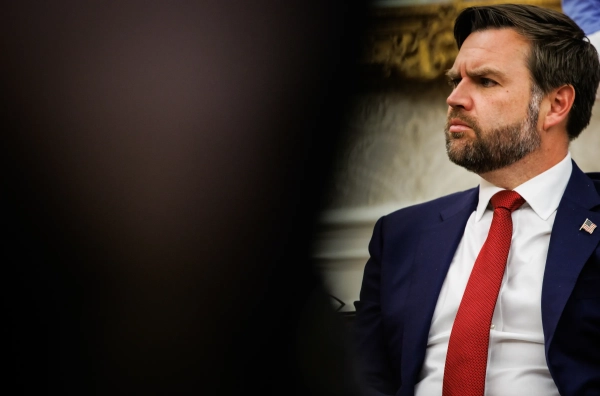
If you’re a liberal, the past week in politics looked like a series of strange self-owns from the Fox News/Trumpist wing of the Republican Party.
First there was the memo from Rep. Devin Nunes, which Sean Hannity hyped would reveal a scandal “worse than Watergate” but proved a dud upon release. Instead of corroborating a conservative line that the case against President Donald Trump was politically motivated, it instead confirmed the New York Times’s reporting that the FBI’s inquiry began with Trump adviser George Papadopoulos’s loose talk.
Then there were new text messages between FBI lawyer Lisa Page and her lover Peter Strzok, an FBI agent who later served on, and was then fired from, Robert Mueller’s probe. Page and Strzok’s past personal texts showed they hoped Trump would lose the election. The new set included a provocative line: Then-President Obama wants “to know everything we’re doing,” Page said.
Conservative reaction was instantaneous. Sen. Ron Johnson (R-WI) said the texts revealed “Obama’s personal involvement in the Clinton email scandal and the FBI investigation of it.” House Judiciary Committee member Rep. Louie Gohmert (R-TX) said that “it means the president [Obama] wants to know what they’re doing to stop Trump.” Trump himself tweeted: “NEW FBI TEXTS ARE BOMBSHELLS!”
All of this proved wrong. As ThinkProgress’s Judd Legum noted, the date of the texts — September 2, 2016 — was after the initial investigation into Clinton’s emails was closed and before the discovery of emails on Anthony Weiner’s laptop (which happened on September 28, 2016, and briefly led to the Clinton investigation being reopened). The Wall Street Journal then reported that the texts referred “to preparation to brief Mr. Obama about Russian interference in that year’s election.” That aligns with the public timeline: We know Obama confronted Vladimir Putin about Russia’s election meddling on September 4, during the September 2016 G20 meeting, so it makes sense that he was being briefed a few days before that.
Finally, Fox News dropped a report on Thursday showing that in March 2017, Sen. Mark Warner, the Virginia Democrat who has been helping lead the Intelligence Committee’s Russia investigation, texted with a Russian oligarch in order to get information on, and potentially meet with, Christopher Steele, the author of the infamous Russia dossier. It isn’t clear what wrongdoing this is supposed to show — it’s reasonable enough that a Democrat on the Senate Intelligence Committee would have wanted to interview Steele, given that his work was influential — but it elicited a predictable Trump tweet:
Less predictable was Sen. Marco Rubio’s sharp response, accusing both Trump and Fox News of trying to spin a scandal out of nothing, and noting that Warner didn’t “get caught”; he’d told the Intelligence Committee exactly what he was doing:
Fox News knew that Warner had disclosed the texts to the committee but didn’t mention it until the seventh paragraph of the story, and didn’t explain that Sen. Richard Burr, the Republican chair of the Intelligence Committee, was aware of Warner’s efforts until the very end of the story.
One way of looking at this past week is as a failure for the conservative spin machine. All three stories crumbled upon contact with the barest scrutiny, embarrassing the outlets and politicians that credulously or cynically promoted them.
The other way of looking at it is as a stunning success, one that gave Trump and his defenders exactly what they wanted.
The logic of alternative facts



Watching all this play out, I’ve been thinking about a profile Molly Ball wrote of Trump adviser Kellyanne Conway, limning her peculiar talent for cheerfully denying the towering masses of factual evidence against her boss’s statements. “She figured out that she doesn’t need to win the argument,” Ball wrote of Conway. “All she has to do is craft a semi-plausible (if not entirely coherent) counternarrative, so that those who don’t want to look past the facade of Trump’s Potemkin village don’t have to.”
We like to imagine American politics as a kind of scored debate, with political actors acting as the debaters, the media acting as the judge, and the public acting as the audience. Much of cable news is based, implicitly or explicitly, on this metaphor. Panelists from different sides of issues are introduced to “debate” an issue; shows sell themselves as “no-spin zones”; networks brag that they’re “fair and balanced” or place “facts first.” Under this conception of American politics, a memo that proves a fraud, an argument that proves a bust, a politician who is seen to lie — all of it is revealed and punished, the system self-regulates.
But that metaphor is often wrong, and it’s particularly wrong in the ecosystem driven by Fox News and Trump’s Twitter account. What Conway and others understand is that if you’re just trying to activate your tribe, you don’t have to win the argument, you just need to have an argument; you need to give your side something to say, something to believe. Something like the Nunes memo or the various out-of-context texts aren’t part of a search for truth — they’re an ammo drop, or, to go back to the way Ball put it, “a semi-plausible (if not entirely coherent) counternarrative.”
Charlie Sykes, a conservative talk radio host turned Trump critic, put it well. “The essence of propaganda is not necessarily to convince you of a certain set of facts. It is to overwhelm your critical sensibilities. It’s to make you doubt the existence of a knowable truth. The conservative media is a giant fog machine designed to confuse and disorient people.”
There is no doubt that the Nunes memo and the various texts have thickened the fog. If you were watching mainstream media outlets, you mostly saw the memo debunked, dismissed. If you were watching Fox News, you saw Tucker Carlson saying, “For the first time in generations Americans have reason to believe that our intelligence and law enforcement agencies gravely misuse the powers we have given them.” If you were watching Trump’s Twitter feed, you saw an all-caps alert of BOMBSHELL, alongside declarations of total victory:
If you want to believe that the Nunes memo, the FBI texts, or the Warner texts show an anti-Trump witch hunt on the part of the FBI, and if you’re following politicians and media organizations that want you to believe that, it’s easy enough to believe it. The argument has internal logic, it sounds plausible, it fits what you’re hearing, it aligns with whom you trust, and you’re seeing what looks like documentary evidence.
Yes, there are plenty of outlets trying to fact-check these claims, plenty of outlets working hard to align their reporting with reality, plenty of outlets trying to explain what’s actually happening. Explaining why it’s not true takes some time, it takes dates, and it takes an interest in the explanation and some interest in the people delivering it. This work never reaches most of the people convinced by the original stories, and it likely wouldn’t be credible to them even if it did. As David Roberts wrote in his important essay on tribal epistemology:
It is hard for any of us to know much about the world firsthand, and that’s particularly true of the political world. We must decide whom to trust. And we make those decisions based in part on our party affiliation, our ideology, the people we admire and the groups we belong to.
What that means is there is no final arbiter in the public debate, no reliable vehicle through which confusion is corrected, through which arguments are scored and judgments rendered. And so much of the war is over whom to trust, and in that, Republicans are making real gains. A new Axios/SurveyMonkey poll found that only 38 percent of Republicans now approve of the FBI — a staggering drop in trust that will help the Trump administration withstand revelations that emerge in part out of FBI investigations.
This is the logic of alternative facts, which is a strategy of base mobilization rather than persuasion. You don’t need to win the argument. You don’t need to even have the facts. All you need is to offer your side an alternative story in which to believe, a story that makes you sound trustworthy and your enemies untrustworthy. And over the past week, Fox News and Donald Trump have done exactly that.
Sourse: vox.com






